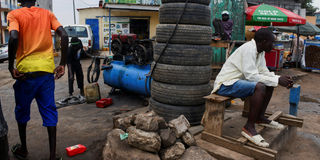South Sudan: Two soldiers injured in night gunfire near former spy chief’s house

Puncture repair artisans prepare to receive customers along the street following a night of gunfire after security forces moved to arrest the former head of the intelligence service, in Juba, South Sudan November 22, 2024.
What you need to know:
- Parts of Juba remained tense, with some businesses closing temporarily.
- Security checks were reported in some areas, and organizations advised staff to stay home as a precaution.
Calm has returned to Juba after a heavy exchange of gunfire occurred at the residence of former South Sudanese spy chief Gen Akol Khoor on the night of Thursday November 21.
The incident, described by the national army chief as a misunderstanding between security forces, left two South Sudan People’s Defence Forces (SSPDF) soldiers wounded.
Reports had indicated there was an attempt to arrest the sacked spy chief but on Friday SSPDF spokesperson Gen Lul Ruai said the clash happened between the inner and outer protection teams stationed at Gen Khoor's residence.
“There was an exchange of gunfire this evening at the residence of former spy chief Gen. Akol Khoor due to a misunderstanding between the layers of the security team protecting him. We have the outer protection force guarding his residence and his inner protection force.
“A misunderstanding arose between the two, leading to the exchange of gunfire. However, the Chief of Defense Forces rushed to the scene and calmed the situation. Investigations are ongoing,” said Gen. Ruai.
He added: “Our own two soldiers were shot and wounded in the incident. But otherwise, the people of South Sudan and those in Juba should be reassured that we have contained the situation.”
Tension high
Despite these assurances, parts of Juba remained tense, with some businesses closing temporarily. Security checks were reported in some areas, and organizations advised staff to stay home as a precaution.
Previous reports suggest the incident may have been triggered by an attempt to arrest the former spy chief, who was dismissed by President Salva Kiir a month ago. Gen Khoor is alleged to be under house arrest since his removal.
On October 2, President Kiir issued a decree dismissing Gen Khoor from his role as the long-time intelligence chief, appointing him as the governor of his home state. However, his appointment was revoked just two days after his arrival in the country, leaving many of his supporters disheartened.
The National Security Bureau (NSS), established in 2011 as South Sudan’s intelligence agency, has been mired in controversy, particularly following the enactment of the 2014 NSS Act. According to Human Rights Watch, this legislation granted the agency sweeping powers of arrest, detention, search, and seizure without adequate civilian or judicial oversight.
Arbitrary detention and torture
The NSS’s Juba-based detention facility, infamously known as the "Blue House," has detained government critics and civil society activists. Notable detainees include Peter Biar Ajak, who later fled to the United States citing threats to his life, and businessman Kerbino Wol, who was killed by government forces after forming the 7th October Movement to advocate for marginalised citizens' rights.
Human rights organisations, including Amnesty International, have documented numerous cases of arbitrary detention, torture, and other forms of mistreatment by the NSS. Detainees often lack access to legal representation or contact with their families.
The NSS's influence reportedly extends beyond South Sudan’s borders. Its spy network is alleged to operate throughout East Africa, with one of the most high-profile incidents being the 2017 forced disappearance of Dong Samuel Luak and Aggrey Idri. The two were abducted in Nairobi, Kenya, and later killed in South Sudan, as confirmed by a UN Panel of Experts.





